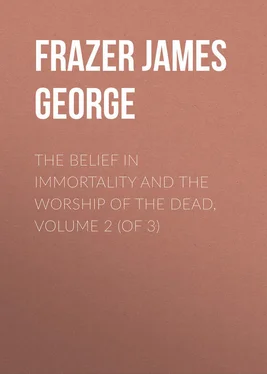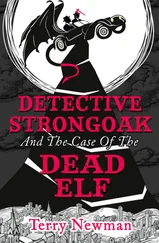James Frazer - The Belief in Immortality and the Worship of the Dead, Volume 2 (of 3)
Здесь есть возможность читать онлайн «James Frazer - The Belief in Immortality and the Worship of the Dead, Volume 2 (of 3)» — ознакомительный отрывок электронной книги совершенно бесплатно, а после прочтения отрывка купить полную версию. В некоторых случаях можно слушать аудио, скачать через торрент в формате fb2 и присутствует краткое содержание. Жанр: foreign_antique, foreign_prose, на английском языке. Описание произведения, (предисловие) а так же отзывы посетителей доступны на портале библиотеки ЛибКат.
- Название:The Belief in Immortality and the Worship of the Dead, Volume 2 (of 3)
- Автор:
- Жанр:
- Год:неизвестен
- ISBN:нет данных
- Рейтинг книги:3 / 5. Голосов: 1
-
Избранное:Добавить в избранное
- Отзывы:
-
Ваша оценка:
- 60
- 1
- 2
- 3
- 4
- 5
The Belief in Immortality and the Worship of the Dead, Volume 2 (of 3): краткое содержание, описание и аннотация
Предлагаем к чтению аннотацию, описание, краткое содержание или предисловие (зависит от того, что написал сам автор книги «The Belief in Immortality and the Worship of the Dead, Volume 2 (of 3)»). Если вы не нашли необходимую информацию о книге — напишите в комментариях, мы постараемся отыскать её.
The Belief in Immortality and the Worship of the Dead, Volume 2 (of 3) — читать онлайн ознакомительный отрывок
Ниже представлен текст книги, разбитый по страницам. Система сохранения места последней прочитанной страницы, позволяет с удобством читать онлайн бесплатно книгу «The Belief in Immortality and the Worship of the Dead, Volume 2 (of 3)», без необходимости каждый раз заново искать на чём Вы остановились. Поставьте закладку, и сможете в любой момент перейти на страницу, на которой закончили чтение.
Интервал:
Закладка:
Thus the worship of natural objects, and especially of animals, fish, and birds, presents a close analogy to the Samoan system, as we shall see presently; 257 257 See below, pp. 154 sq.
and it is not without significance that tradition points to Samoa as the original home from which the ancestors of the Tongans migrated to their present abode. 258 258 E. E. V. Collocot, op. cit. p. 239.
On the question of the nature of the divine beings who presented themselves to their worshippers in the form of animals, the evidence collected by Mr. Collocot seems to confirm the statement of Mariner, that only the primary or non-human gods were believed capable of thus becoming incarnate; at least Mr. Collocot gives no hint that the worshipful creatures were supposed to be tenanted by the souls of the human dead; in other words, there is nothing to show that the Tongan worship of animals was based on a theory of transmigration.
The statement of Miss Farmer, which I have quoted, that among the Tongans the souls of the dead were the principal object of worship and received the most sacrifices, is interesting and not improbable, though it is not confirmed by Mariner. It may indeed, perhaps, be laid down as a general principle that the worship of the dead tends constantly to encroach on the worship of the high gods, who are pushed ever farther into the background by the advent of their younger rivals. It is natural enough that this should be so. The affection which we feel for virtue, the reverence and awe inspired by great talents and powerful characters, persist long after the objects of our love and admiration have passed away from earth, and we now render to their memories the homage which we paid, or perhaps grudged, to the men themselves in their lifetime. For us they seem still to exist; with their features, their characteristic turns of thought and speech still fresh in our memories, we can hardly bring ourselves to believe that they have utterly ceased to be, that nothing of them remains but the lifeless dust which we have committed to the earth. The heart still clings fondly to the hope, if not to the belief, that somewhere beyond our ken the loved and lost ones are joined to the kindred spirits who have gone before in that unknown land, where, in due time, we shall meet them again. And as with affection, so with reverence and fear; they also are powerful incentives to this instinctive belief in the continued existence of the dead. The busy brain that explored the heights and depths of this mysterious universe – the glowing imagination that conjured up visions of beauty born, as we fondly think, for immortality – the aspiring soul and vaulting ambition that founded or overturned empires and shook the world – are they now no more than a few mouldering bones or a handful of ashes under their marble monuments? The mind of most men revolts from a conclusion so derogatory to what they deem the dignity of human nature; and so to satisfy at once the promptings of the imagination and the impulse of the heart, men gradually elevate their dead to the rank of saints and heroes, who in course of time may easily pass by an almost insensible transition to the supreme place of deities. It is thus that, almost as far back as we can trace the gropings of the human mind, man has been perpetually creating gods in his own likeness.
In a pantheon thus constantly recruited by the accession of dead men, the recruits tend to swamp the old deities by sheer force of numbers; for whereas the muster-roll of the original gods is fixed and unchangeable, the newcomers form a great host which is not only innumerable but perpetually on the increase, for who can reckon up the tale of the departed or set bounds to the ravages of death? Indeed, where the deification of the dead is carried to its logical limit, a new god is born for every man that dies; though in Tonga against such an extreme expansion of the spiritual hierarchy, and a constant overcrowding of Bolotoo, a solid barrier was interposed by the Tongan doctrine which opened the gates of paradise only to noblemen. 259 259 We have seen (p. 70) that according to Mariner the number of the original gods was about three hundred; but as to the deified noblemen he merely says that "of these there must be a vast number" ( Tonga Islands , ii. 109). In his "Notes on Tongan Religion" ( Journal of the Polynesian Society , xxx. (1921) p. 159) Mr. E. E. V. Collocot remarks: "The number of the gods, moreover, was liable to constant augmentation by the deification of the illustrious or well-beloved dead." As a notable instance he cites the case of a certain chief named Fakailoatonga, a native of Vavau, who subdued or overran a large part of Tongataboo. He was a leper, but for a long time did not know the true nature of his malady. When he learned the truth, he in disgust buried himself alive, and after his death he was elevated to the godhead. But in this deification, if Mariner is right, there was nothing exceptional; as a chief he became a god after death in the course of nature.
§ 10. Temples and Tombs: Megalithic Monuments
On the whole it seems reasonable to conclude that in Tonga the distinction between the original superhuman deities and the new human gods tended to be obliterated in the minds of the people. More and more, we may suppose, the deified spirits of dead men usurped the functions and assimilated themselves to the character of the ancient divinities. Yet between these two classes of worshipful beings Mariner draws an important distinction which we must not overlook. He says that these new human gods, these souls of deified nobles, "have no houses dedicated to them, but the proper places to invoke them are their graves, which are considered sacred, and are therefore as much respected as consecrated houses." 260 260 W. Mariner, Tonga Islands , ii. 110
If this distinction is well founded, the consecrated house or temple, as we may call it, of an original god was quite different from the grave at which a new god, that is, a dead man or woman, was worshipped. But in spite of the high authority of Mariner it seems doubtful whether the distinction which he makes between the temples of the old gods and the tombs of the new ones was always recognised in practice, and whether the two were not apt to be confounded in the minds even of the natives. The temples of the gods, as we have seen, did not differ in shape and structure from the houses of men, and similar houses, as we shall see, were also built on the graves of kings and chiefs and even of common people. What was easier than to confuse the two classes of spirit-houses, the houses of gods and the houses of dead kings or chiefs, especially when the memory of these potentates had grown dim and their human personality had been forgotten? Certainly European observers have sometimes been in doubt as to whether places to which the natives paid religious reverence were temples or graves. In view of this ambiguity I propose to examine some of the descriptions which have been given by eye-witnesses of the sacred structures and enclosure which might be interpreted either as temples or tombs. The question has a double interest and importance, first, in its bearing on the theory, enunciated by Herbert Spencer, that temples are commonly, if not universally, derived from tombs, 261 261 Herbert Spencer, Principles of Sociology , vol. i (London, 1904) pp. 249 sqq.
and gods from dead men; and secondly, in its bearing on the question of the origin and meaning of megalithic monuments; for not a few of the tombs of Tongan kings and sacred chiefs are constructed in part of very large stones.
I will begin with the evidence of Captain Cook, an excellent observer and faithful witness. He paid two visits to the Tonga islands, a short one in 1773, and a longer one of between two and three months in 1777. Speaking of his first visit to Tongataboo in 1773, he writes as follows:
Читать дальшеИнтервал:
Закладка:
Похожие книги на «The Belief in Immortality and the Worship of the Dead, Volume 2 (of 3)»
Представляем Вашему вниманию похожие книги на «The Belief in Immortality and the Worship of the Dead, Volume 2 (of 3)» списком для выбора. Мы отобрали схожую по названию и смыслу литературу в надежде предоставить читателям больше вариантов отыскать новые, интересные, ещё непрочитанные произведения.
Обсуждение, отзывы о книге «The Belief in Immortality and the Worship of the Dead, Volume 2 (of 3)» и просто собственные мнения читателей. Оставьте ваши комментарии, напишите, что Вы думаете о произведении, его смысле или главных героях. Укажите что конкретно понравилось, а что нет, и почему Вы так считаете.











